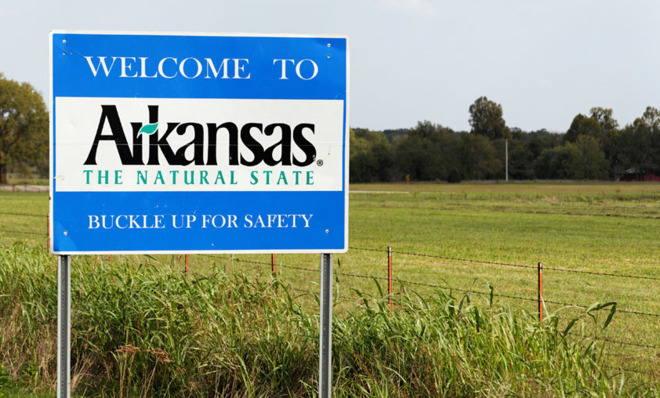Why isn't 'Arkansas' pronounced like 'Kansas'?
It goes back to two Native American tribes. And the French.


A free daily email with the biggest news stories of the day – and the best features from TheWeek.com
You are now subscribed
Your newsletter sign-up was successful
Kansas and Arkansas aren't so far from each other on the map, but their names seem to want nothing to do with each other. Though they share all but two letters in common, Kansas comes out as "KANzis" and Arkansas as "ARkansaw." Why so different?
Kansas was named for the Kansa, a Siouan tribe that lived in the region. The Kansa people were called, in plural, Kansas, and that became the name of the state. But before it did, English, French, and Spanish speakers, as well as speakers of various Native American languages, all came up with their own ways of pronouncing (and writing) the name of the tribe. The Kansa themselves pronounced it with a nasalized "a" (rather than a full "n"), a "z," and an "eh" sound – approximately "kauzeh." Everyone else had their own versions, and historical records show all kinds of spellings: Kansa, Kansas, Kantha, Kances, Konza, Kauzas, Canees, Canceys… Eventually, Kansas won out.
Arkansas was named for a related Siouan tribe, the Quapaw. The Algonquians called them "akansa," joining their own a- prefix (used in front of ethnic groups) to the Kansa name (the same root as that for Kansas). The Algonquians' name for the Quapaw was picked up by others, and was also spelled in various ways: Akancea, Acansea, Acansa. However, it was the French version, Arcansas, that became the basis for the eventual state name. In French the final plural s is not pronounced. Somehow, the English speakers that took over after the Louisiana Purchase decided to go with a modified French spelling along with a French pronunciation – an s on the page, but not on the tongue. (Incidentally, the name Ozark comes from French aux Arcs, short for aux Arcansas. And the same native word that became Wichita in Kansas went with the Frenchified spelling Ouachita in Arkansas.)
The Week
Escape your echo chamber. Get the facts behind the news, plus analysis from multiple perspectives.

Sign up for The Week's Free Newsletters
From our morning news briefing to a weekly Good News Newsletter, get the best of The Week delivered directly to your inbox.
From our morning news briefing to a weekly Good News Newsletter, get the best of The Week delivered directly to your inbox.
Actually, it took some time for Arkansans to come to agreement on pronunciation. In 1881, a heated disagreement between the state's two senators, one who said "arKANzis" and the other who said "ARkansaw," led to a ruling by the state legislature making the "ARkansaw" pronunciation official. Ever since, Americans have gone along with the s-less, first-syllable-stressed version of Arkansas. At least when it comes to the state name. The people of Kansas don't go any further than that. For them it's the "arKANzis" River, and "arKANzis" City.
A free daily email with the biggest news stories of the day – and the best features from TheWeek.com
Arika Okrent is editor-at-large at TheWeek.com and a frequent contributor to Mental Floss. She is the author of In the Land of Invented Languages, a history of the attempt to build a better language. She holds a doctorate in linguistics and a first-level certification in Klingon. Follow her on Twitter.
-
 Local elections 2026: where are they and who is expected to win?
Local elections 2026: where are they and who is expected to win?The Explainer Labour is braced for heavy losses and U-turn on postponing some council elections hasn’t helped the party’s prospects
-
 6 of the world’s most accessible destinations
6 of the world’s most accessible destinationsThe Week Recommends Experience all of Berlin, Singapore and Sydney
-
 How the FCC’s ‘equal time’ rule works
How the FCC’s ‘equal time’ rule worksIn the Spotlight The law is at the heart of the Colbert-CBS conflict
